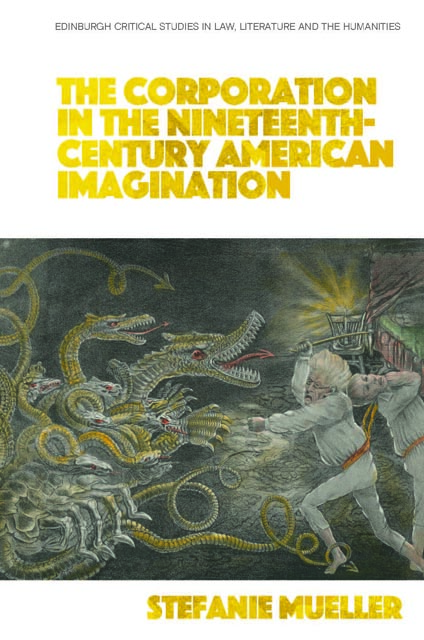Book contents
- Frontmatter
- Contents
- List of Figures
- Acknowledgments
- Introduction: The Many and the One: Corporate Bodies and the Body Politic in US Law and Culture
- 1 Narrating Monopoly and Empire: Austin, Irving, and the Charles River Bridge Case
- 2 The Soulless Corporation: Cooper and the Decline of the Republic
- 3 Satanic Corporate Agents in the Marketplace: Hawthorne, Melville, De Forest, and the Uses of Allegory
- 4 Incorporating the Nation: Ruiz de Burton and “Quasi Public” Corporations
- 5 The End of Individualism: Tarbell, Norris, and the Power of Combinations
- Conclusion: Frankenstein in a Gray Flannel Suit
- Bibliography
- Index
3 - Satanic Corporate Agents in the Marketplace: Hawthorne, Melville, De Forest, and the Uses of Allegory
Published online by Cambridge University Press: 25 April 2023
- Frontmatter
- Contents
- List of Figures
- Acknowledgments
- Introduction: The Many and the One: Corporate Bodies and the Body Politic in US Law and Culture
- 1 Narrating Monopoly and Empire: Austin, Irving, and the Charles River Bridge Case
- 2 The Soulless Corporation: Cooper and the Decline of the Republic
- 3 Satanic Corporate Agents in the Marketplace: Hawthorne, Melville, De Forest, and the Uses of Allegory
- 4 Incorporating the Nation: Ruiz de Burton and “Quasi Public” Corporations
- 5 The End of Individualism: Tarbell, Norris, and the Power of Combinations
- Conclusion: Frankenstein in a Gray Flannel Suit
- Bibliography
- Index
Summary
By the beginning of the 1840s, the US economy had temporarily recovered from the financial panic that followed the end of the Second Bank and its financial politics, and it offered a new vista for entrepreneurial individuals. New technologies (steam power in particular) and the expansion of the market from regional to national meant new opportunities, and with rising immigration rates, more people than ever sought out these opportunities in America. Against this backdrop, and because of the need for better transportation infrastructures, critics of corporate monopoly finally got their wish: general incorporation statutes became more and more common and helped to turn corporations from a special privilege of the few into a common business tool for the many—or so it seemed. What this trend also meant was that corporate enterprises became part of a new financial landscape that was not always easily understandable or readable for the enterprising common man. In fact, we could say that the democratization of the corporate form (through general incorporation statutes) also meant a privatization and individualization of the risks involved in corporate finance. Accordingly, in a changing economic landscape—in which more business opportunities than ever were becoming available to the common man, but financial panics and depression also meant the very real possibility of a swift downward turn of fortune—corporations and the strangers that represented them also became associated with the hoaxes, frauds, and confidence games that unsettled middle-class America in the antebellum period. Most of the time, this meant that they encountered corporate agents: the representatives of corporations that acted in their names and interests, at least in theory. Rather than an embodiment of the corporation, the corporate agent became an emblem of the anonymity and obscurity of corporate enterprise—essentially, a problem of knowledge in the market.
Covering the period from the 1840s to the 1870s, this chapter provides a brief overview of the epistemic challenge that the corporation presented in a transforming market and a transforming nation. The first section introduces the economic, social, and cultural changes that characterized the antebellum period and provided the setting for the legal case under consideration in this chapter: Louisville, Cincinnati and Charleston Rail-road Company v. Thomas W. Letson (1844). It stands for a US Supreme Court decision which held that corporations were citizens under the Judiciary Act of the Constitution.
- Type
- Chapter
- Information
- Publisher: Edinburgh University PressPrint publication year: 2022



